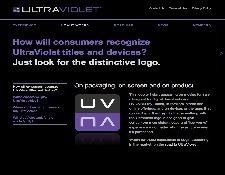DECE Launches Consumer Brand

The Digital Entertainment Content Ecosystem (DECE), a consortium of movie studios, technology firms, retailers and pay-TV operators formed last year to create a common digital rights management (DRM) system that will allow consumers to buy a movie or TV show and enjoy it on an array of devices, has unveiled a consumer brand: UltraViolet.
While no firm plans for a consumer launch of UltraViolet and its cloud-based rights system have been unveiled, the hope is that the UltraViolet logo will eventually makes its way onto an array of devices including connected TVs, PCs, game consoles, smartphones and tablet PCs, says Mitch Singer, DECE president and CTO of Sony Pictures Entertainment.
DECE used the branding firm Lexicon to help pick the name, which Singer finds appropriate.
"UltraViolet is outside the color spectrum, so it's all around you," he notes. "It follows you around, even though you don't see it or think about it."
Defined simply, the UltraViolet system would allow a consumer to buy a piece of content, such as a Blu-ray disc of the Sony movie "SpiderMan 4", and also receive a "token" that would go in a cloud-based Digital Rights Locker. That consumer would then have the ability to watch that movie on any UltraViolet-enabled device or service, whether it be a broadband-enabled Playstation game console, a laptop or even Comcast's video-on-demand service.
Since the Digital Rights Locker is located in an Internet-connected cloud, where the movie was initially purchased or the location or device on which they're trying to view it is irrelevant, as long as the device can recognize the UltraViolet token. In that way, the system is somewhat similar to the cable industry's "TV Everywhere" initiative, in that consumers get portability of content that they've already paid for. The difference is that the initial implementation of UltraViolet is either for sales of physical media or electronic sell-through (where movies are delivered as digital files), not subscription services.
"DECE is really based on a notion of an authentication service," says Singer. "It's a rights locker in the cloud."
Broadcasting & Cable Newsletter
The smarter way to stay on top of broadcasting and cable industry. Sign up below
With that in mind, two family members in distant locations could both remotely access a piece of authorized content on UltraViolet devices. Another application that could be enabled under UltraViolet is for a consumer to buy a device with digital storage, such as a gaming console or home media server, from a retailer like Best Buy and have all their authorized content already preloaded for them.
DECE LLC is not the only organization working on such a system; Disney and Apple are pursuing a similar concept called KeyChest. But DECE has attracted almost sixty companies to its ranks with significant representation from the cable industry including CableLabs, Comcast, Cox and Liberty Global. Singer notes that the rollout of UltraViolet would allow operators, who primarily offer movies on a rental basis today, to easily enter the electronic sell-through market.
Mark Coblitz, SVP of Strategic Planning of Comcast, says that the cable giant is a big supporter of DECE but is not in a position to announce any commercial rollout of UltraViolet-branded services. Coblitz, who has been intimately involved in the development of DECE over the past two and a half years, says that UltraViolet should be viewed as being complementary to Comcast's VOD and TV Everywhere services by giving subscribers more flexibility and portability in enjoying content.
Coblitz doesn't expect the UltraViolet logo to wind up on leased set-tops anytime soon. But he says the UltraViolet logo could eventually appear on the operator's Fancast video portal, which already sells some titles in addition to providing a wealth of free movies and TV shows.
While Comcast already has extensive subscriber management and billing systems, says Coblitz, putting digital rights in a cloud managed by a third-party (in this case, the network management firm Neustar) is the only way to achieve true portability of content across devices and locations.
"The only way to manage the rights is to have it in the cloud, and let it be shared with everyone," he says. "It shouldn't matter who sold the content to the consumer, as long as they want to stream it or have it downloaded."
